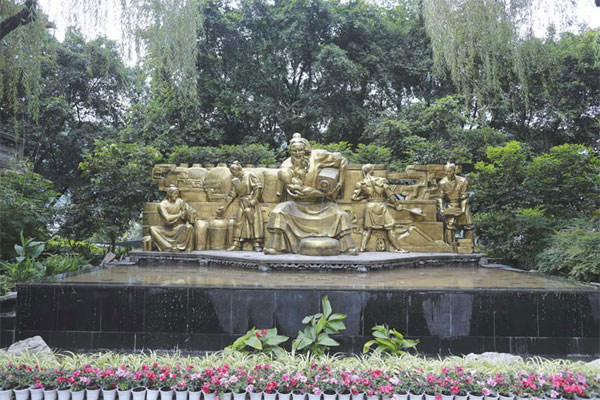
Du Kang, the god of liquor who is said to have taught people how to make baijiu, is venerated by the locals in Maotai town. Feng Yongbin /
Sprawling facility at Maotai shows its distinctive heritage
When one thinks about visiting an alcohol-related experience center, the obvious choices that come to mind are the Guinness factory in Dublin, the Scotch Whiskey Experience in Scotland or perhaps France's Museum of Cognac History.
For those outside China seeking a spirit-fuelled experiential adventure, the word baijiu (white spirit) seldom comes to mind. But tucked away in Maotai town in Guizhou province, is the National Liquor Culture Museum.
It's impressive enough to attract even the most discerning liquor enthusiast. Britain's Prince Andrew toured the museum just in October.
The museum grounds are nestled among the town's existing production and storage buildings and surrounded on one side by heavy construction works. Areas of the town not already taken up by buildings used in fermenting sorghum, small independent distilleries and dispensaries, or the occasional hotel, are under construction. Such is the allure and reputation of the Moutai brand that the group is investing heavily to make the town a top tourist destination. A five-star hotel, a tasting center, state-of-the-art headquarters and apartments, and a nearby airport are under construction or will be soon.
At 30,000 square meters, with seven rooms and a collection of more than 5,000 artifacts, cultural relics, paintings and books dating as far back as the Han Dynasty (206 BC-AD 221), the museum was recognized as the 'largest liquor culture museum in the world' by the Guinness World Records in 1999 shortly after the building's completion in 1997.
The museum's total of nine halls spanning the early Han Dynasty to the modern age begin in a typical chronological fashion starting in 156-87 BC when Emperor Wudi received baijiu from the people of the Maotai region as a tribute. The drink was special enough to have the emperor record there was "something good tasting in Guizhou" - a record of the event that can still be seen in the museum.
Something you might well catch a glimpse of in Maotai and certainly in the museum is Du Kang, a burly figure with a cheerful countenance often depicted in paintings and sculptures pouring a large jug of baijiu. He is widely understood to be the inventor and "god of baijiu" by locals. Many of them - mostly Moutai staff - ceremoniously burn incense and offer food to Du Kang each year before reciting a vow to keep up the impeccable reputation of the national liquor in the coming year.
Despite homage to Du Kang as the inventor of baijiu, it is actually monkeys who first discovered it, according to the museum's antique records. Ancient novels say that the monkeys removed various fruits, left them to ferment and then drank the resulting alcoholic concoction.
Perhaps one of the most striking aspects of the museum is the array of drinking vessels on display from the local region as well as other areas in China. The sheer intricacy and workmanship of the vessels are a testament to the cultural and social importance of alcohol in ancient China. Liquors found in vessels from the Shang (1600 BC-1046 BC) and Zhou (1046 BC-256 BC) dynasties remain clear and fine - though there were no volunteers to drink it.
Moving through the initial main hall of the museum, visitors can experience the development of baijiu through the years, as processes became more refined to create stronger liquor. Full scale models of women crushing grains underfoot in preparation for fermentation, a tradition still upheld in the town today, is the centerpiece.
















































